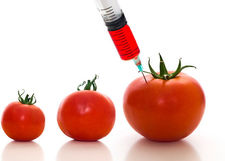
Tomato or ToCODo; A New Look at GMO's in Europe
 GMO’s, or genetically modified organisms, have been a hot topic since the early 2000s. A GMO is an organism that has been modified or changed through genetic engineering. In food and crop science, it is common to take a gene from another organism, be it a plant, bacteria, virus, or animal and insert it into another organism to increase its usefulness in the food industry. There are many examples of the benefits of GMO crops, for example; scientists have developed tomatoes that resist frost or freezing temperatures by inserting a gene from a coldwater fish. So they may call that a tomato, but I call that a toCODo. While the FDA has deemed these products safe, many people argue that there are negative consequences to this practice. Anti- GMO activists tend to point to these negative consequences of genetic engineering in the food industry.GMO’s are unhealthy- studies point to organ damage, gastrointestinal and immune system disorders, accelerated aging, and infertility.
GMO’s, or genetically modified organisms, have been a hot topic since the early 2000s. A GMO is an organism that has been modified or changed through genetic engineering. In food and crop science, it is common to take a gene from another organism, be it a plant, bacteria, virus, or animal and insert it into another organism to increase its usefulness in the food industry. There are many examples of the benefits of GMO crops, for example; scientists have developed tomatoes that resist frost or freezing temperatures by inserting a gene from a coldwater fish. So they may call that a tomato, but I call that a toCODo. While the FDA has deemed these products safe, many people argue that there are negative consequences to this practice. Anti- GMO activists tend to point to these negative consequences of genetic engineering in the food industry.GMO’s are unhealthy- studies point to organ damage, gastrointestinal and immune system disorders, accelerated aging, and infertility.
- GMO’s harm the environment- GMO crops are designed to be tolerant to weed killer. This causes farmers to increase the use of herbicide, causing more environmental harm.
- GMO’s are unhealthy- studies point to organ damage, gastrointestinal and immune system disorders, accelerated aging, and infertility.
- Genetic engineering creates unwanted side effects- When you mix genes from unrelated species new toxins, allergens, carcinogens, and nutritional deficiencies can be created.
Studies in the US continue to fuel both sides of the debate. In Europe it is a different story though. In the early 2000s, the European Union, sought to ban the growing and cultivation of all GMO crops and products. 19 countries in total agreed to this ban including Germany, France, and Italy. Here is a map of the countries that have banned GMO crops. As a result of this ban, food scientists in Europe have been very cautious with their research. This has caused a debate surrounding the definition of the term GMO. More specifically, do new gene editing practices fall under the ban established by the EU? For example, a Swedish scientist developed a type of genetically modified weed that grows slower than the common variety of weeds (Read more about it here). This is accomplished using a new safer method of genetic engineering called CRISPR. CRISPR has been scientifically proven to increase precision, efficiency, and flexibility of genetic engineering. Many food scientists believe that this method is much safer and more reliable than older GMO practices because of its ability to make smaller edits to the genome. As a result, plants and organisms altered through CRISPR do not have any foreign or unrelated DNA.
If CRISPR is ruled legal, than researchers, like the Swedish scientists mentioned above, will receive increased funding, as well as, marketability for their solutions. Proponents of CRISPR believe that since the method results in an organism that contains no foreign DNA, than it should not fall under the EU’s ban. Others still point to the dangers of genetic engineering. The EU still has not ruled on CRISPR, so scientists in Europe continue to walk the legal research line. At Ham Farms, science is not our best subject, so we don’t mess with GMO’s. You can rest assured that all of our delicsious are 100% natural and harvested straight from the Earth.